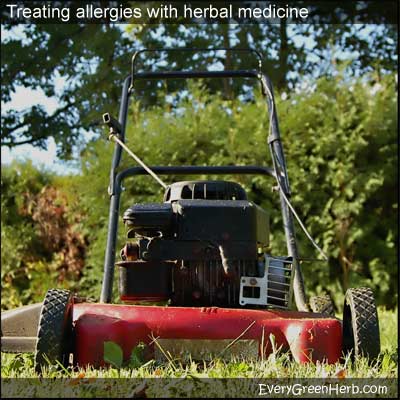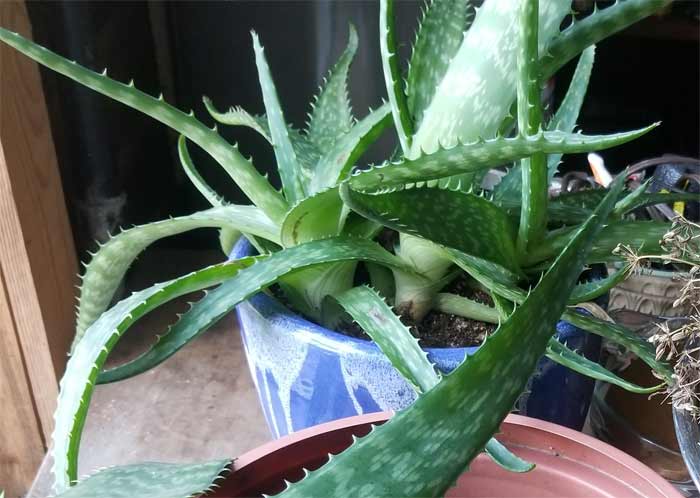Herbs for allergies / allergic rhinitis
Are you allergic to pollen, smoke, pet hair, or certain foods? You are not alone! Millions of people suffer from allergies.

Herbs can help relieve allergy symptoms.
Many hay fever sufferers find relief with ginkgo biloba or ginger. Other herbs for the treatment of allergies include evening primrose, echinacea, nettle, aloe, cat's claw, goldenrod, licorice, butterbur, and eyebright.
People with allergies should also take immune building herbs like astragalus on a regular basis especially in spring and summer. Everyone is different so it can take time to find what works best.
Try one thing at a time for a week or so, and take notes so you can compare later.
What are common allergy symptoms?
Allergic reactions from pollen, dust, smoke, pollution, pet fur, dust mites, and other irritants can cause all kinds of symptoms ranging from a runny nose and itchy eyes to anaphylactic shock.
The main symptoms of allergic reactions include sneezing, wheezing, hives, swelling, mucus buildup, burning eyes, red eyes, itching, and difficulty breathing. If you are someone you know is experiencing breathing problems, seek emergency help immediately!
Read about herbs for red, itchy eyes
What are allergies?

Allergies are hyper-sensitivity reactions caused by a response initiated by the immune system. Hay fever caused by pollen in the air is a common type of allergy and often occurs in people with excess mucous.
If suffering from pollen related allergies, you might want to stay indoors on days with high pollen counts and cut back on dairy foods which cause more mucous.
Websites like pollen.com give detailed information about pollen levels in the United States. When pollen levels are high, do not exercise outdoors!
Soothe allergy symptoms with herbs.
- Relieve itching and watery eyes with a splash of eyebright tea.
- Ease asthma congestion by inhaling rosemary or eucalyptus essential oil aromas.
- Build resistance and support the immune system with garlic.
- Take locally-produced honey in the winter months to reduce intensity and duration of springtime allergies.
- Detoxify the blood with green tea.
- Support liver function with milk thistle seed and dandelion root.
- Fight inflammation with bilberry.
- Support the adrenal glands with astragalus, licorice, and liquid chlorophyll via green drinks.
Horseradish will clear the sinuses.
To remove accumulated mucus from the sinuses, take 1 teaspoon of grated fresh horseradish mixed with a little freshly-squeezed lemon juice. Inhale the horseradish fumes while grating, and hold the mixture in your mouth for a few minutes before swallowing (you can also spit it out).
This remedy works great on stuffed-up noses caused by allergies, sinus infections, and colds. Better get a box of tissue or stand over the sink, because mucus is going to run out when you take horseradish.
I use this natural remedy when sick with a cold or flu to clear my sinuses before bed. It sure helps me get a restful nights sleep.
Find more medicinal uses for horseradish
Elecampane clears the airways
If your lungs feel like they won't expand, and breathing takes a lot of effort, you need a dropper full of elecampane tincture. It works quickly, within a few minutes.
Elecampane is a well known European herb that is gaining popularity in the United States. Purchase in tincture form for best results.
Read more about treating the lungs with natural remedies.

Allergies and food
A change in diet is the best remedy for many allergies. Fresh organic vegetables, fruits, and juices are essential, but some people are allergic to strawberries and other fruits. It may be the pesticides or herbicides used on the plants. You will have to do some digging to see what is causing your allergy.
Lots of live enzymes in the diet help lessen the severity of allergies. Drink green drinks and eat as healthy as possible!
Some other foods may cause allergic reactions in sensitive people. Eggs, milk, peanuts, soy, wheat, chocolate, strawberries, fish, and shellfish are the most common food allergens.
Symptoms usually involve the skin or intestines, and can begin within a few seconds after ingesting the offending food.
Sneezing, wheezing, lung problems, swelling of the tongue and lips, skin rashes, hives, eczema, cramps, nausea, vomiting, and diarrhea are all signs of food intolerance.
If your food allergy is not severe or life-threatening, take a spoonful of royal jelly and bee pollen with some ginseng tea. You should get relief within a few minutes.
Use herbal remedies only when symptoms are mild. If breathing becomes labored or the tongue starts to swell, seek emergency care as soon as possible.

Lifestyle changes can reduce allergies.
Lifestyle changes can greatly reduce the chances of an allergic reaction by removing the underlying cause. Some are easier to implement than others.
- Move to an area with green-space and cleaner air if possible.
- Quit eating overly-processed foods and all produce that is sprayed with pesticides, colorants, waxes, or ripening agents.
- To be on the side of safety, avoid genetically modified foods, although herbicide residue is probable worse for the body than GMO's.
- Keep fish as pets, instead of animals that shed.
- Vacuum daily and consider leaving all shoes and coats at the doorway.
- Make sure your walls are not harboring mold and mildew.
- Wash bedding often.
- Do away with wall-to-wall carpets and opt for wood floors with washable rugs.
- Switch from feather pillows to ones with man-made fibers.
- Use household cleansers like vinegar instead of harsh chemicals.
- Invest in an air purifier.
There are many ways to reduce allergens in your home if you just look around.
Acupressure can help stop allergies.
Some allergies are brought on by air-borne irritants such as pollen and smoke. In these cases, acupressure can sometimes stop an attack.
Try pressing hard on the tip of the nose or the hollow above the center of the upper lip. Another technique is pressing in an upward motion under and over the cheekbones. Many alternative medicines can help people that suffer with allergies.
Rashes can be symptoms of allergic reactions.
Eczema and hives are often reactions to ordinary household products. Synthetic fabrics, some natural fabrics like wool, detergent, deodorant, fragrances, or strong soap can be the offending culprit.
Some people are even allergic to florescent lighting, aluminum cookware, microwave ovens, and non-filtered computer screens.
When there is a sudden onset of allergic symptoms, any new product is suspect. If you experience lots of skin problems and rashes, keep a journal.
Try changing laundry detergents, bath soaps, and anything that comes in contact with your body. Keep notes of results.
When trying new products, only try one thing at a time to make sure it is safe for your skin type and immune system.

Remedies for skin allergies
There are many herbal remedies for rashes and skin problems caused by allergic reactions. Applications of Aloe Vera mixed with a drop of diluted frankincense oil, plantain poultices, and oatmeal baths really help.
Welts and blisters call for ice packs. It is best not to use heat on rashes, although there are exceptions to every rule.
If suffering with poison ivy rash, running hot water over the affected area will cause intense itching for a few seconds, then the area will not itch again for hours! Use this remedy with caution since heat can cause some rashes to worsen or spread. I use the hot water relief method when it is the only way I can get some rest.
Itchy, inflamed skin can be caused by allergies and other health problems including fatty liver disease, constipation, and urinary problems. If you have problems with your liver, intestines, or urinary tract, rashes are to be expected.
You should treat the underlying condition to avoid these types of skin problems.
*Asthma, eczema, hay fever, food allergies, and hives can be life-threatening conditions. Always consult with your health care professional before using any herbal remedy.
Sources:
https://www.ncbi.nlm.nih.gov/pmc/articles/PMC4118473/
Blessings to you and yours!
Thanks so much for reading my blog. Jan.

*Note - the information on this website has not been evaluated by the Food and Drug Administration.
© 2005-2024 website design and content by Janice Boling